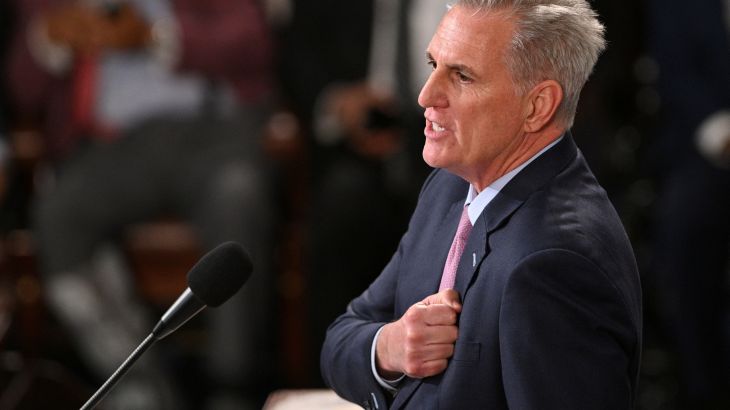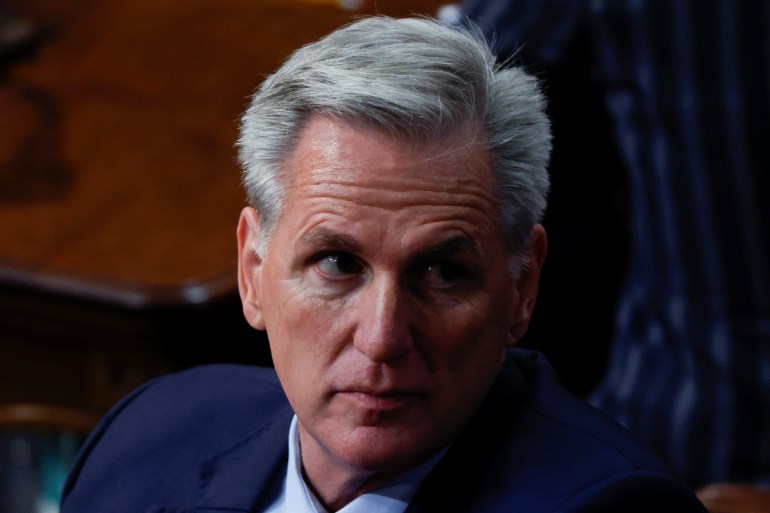McCarthy becomes US House speaker, but with diminished power
The 57-year-old representative’s elevation comes after making major concessions to an ultraconservative bloc of the party.

Republican Kevin McCarthy was elected as the speaker of the US House of Representatives on Saturday after five days of chaotic voting. But his elevation comes after conceding major concessions to an ultraconservative bloc of the party.
The 57-year-old representative from California suffered one final humiliation when Representative Matt Gaetz withheld his vote on the 14th ballot as midnight approached, prompting a scuffle in which fellow Republican Mike Rogers had to be physically pulled away.
Keep reading
list of 3 itemsUS House still without speaker as McCarthy keeps falling short
Republican Kevin McCarthy elected US House speaker
McCarthy’s victory in the 15th ballot ended the deepest congressional dysfunction in more than 160 years. But it sharply illustrated the difficulties he will face in leading a narrow and deeply polarised majority.
He won at last on a margin of 216-212. He was able to be elected with the votes of fewer than half the House members only because six in his own party withheld their votes – not backing McCarthy as leader, but also not voting for another contender.
Republicans’ weaker-than-expected performance in November’s midterm elections left them with a narrow 222-212 majority, which has given outsized power to the radical right-wingers who opposed McCarthy’s leadership.
As he took the gavel for the first time, McCarthy represented the end of President Joe Biden’s Democrats’ hold on both chambers of Congress.

“Our system is built on checks and balances. It’s time for us to be a check and provide some balance to the president’s policies,” McCarthy said in his inaugural speech, which laid out a wide range of priorities, including cutting spending and immigration.
Like the two most recent Republican speakers, John Boehner and Paul Ryan, McCarthy takes the helm of a restive, rebellious House majority, mirroring that split in the larger party itself, between what’s left of the Grand Old Party conservatives and a new generation of tea party-to-Donald Trump hard-liners.
Chaos in the House
The chaos that erupted in days of House voting, halting the start of the new Congress, is a prelude to the highly uncertain path ahead as McCarthy tries to lead an unruly Republican majority to achieve its priorities and confront President Biden’s agenda – and maybe even keep the government from shutting down.
“This is the great part: Because it took this long, now we learned how to govern,” McCarthy, who was first elected in 2006, suggested as he rounded towards victory.
McCarthy has emerged as a weakened speaker, one with less authority on paper than his predecessor, Democrat Nancy Pelosi. That was particularly true because he agreed to a demand by hard-liners that a single House representative be able to call for his removal at any time.
That will sharply cut the power he will hold when trying to pass legislation on critical issues including funding the government, addressing the nation’s looming debt ceiling and other crises that may arise.
“One of the holdouts, Matt Gaetz, who led the ultra-conservative wing of the Republican party against McCarthy, when asked by reporters why he changed his vote in the end, his answer was: ‘Well, he gave us everything that we asked for,'” Al Jazeera’s Heidi Zhou-Castro said.
“And that kind of sums up how much power Speaker McCarthy was forced to give away to the [ultra] conservative wing of his party,” she said reporting from Washington, DC.
However, McCarthy may become emboldened as a survivor who withstood one of history’s most brutal brawls for power and who prides himself on being an underestimated political fighter.
“Apparently, I like to make history,” McCarthy quipped at one point during the raucous week.
McCarthy staked his political career on the early backing of Trump, and it was the former president who delivered when needed, making late phone calls to holdouts and “helping get those final votes”.
When it was finally over, when McCarthy walked into the speaker’s office at the Capitol, the sign bearing his name already was hanging.
Challenges ahead
Plenty of tests awaited the newly elected speaker.
Congress faces an agenda of must-pass bills to fund the government, restock a military whose supplies have been depleted by decades of war and aid to Ukraine, authorise farming programmes and raise the nation’s borrowing limit to avert an unprecedented federal default.
For the first time as president, Biden will face a divided government, with the House in Republican hands and the Senate still controlled, though narrowly, by Democrats.
Divided government can be a time of bipartisan deal-making as the parties come together to accomplish big priorities. But more often, it results in brinksmanship that has led to stalemates, standoffs and shutdowns.
House Republicans are eager to confront Biden with oversight of the White House’s handling of the US-Mexico border, the COVID-19 crisis and other issues, along with investigations of Biden, his family and his administration.
“One-third of seats on the influential rules committee will go to the conservative wing of the party. [Why this matters is,] this committee clears all legislations prior to allowing it to go to the floor for debate or for a vote,” Al Jazeera’s Heidi Zhou-Castro said.
Democrat Senate Majority Leader Chuck Schumer warned that the concessions McCarthy made to “the extremists” in his party may come back to haunt him, and made it more likely that the Republican-controlled House will cause a government shutdown or default with “devastating consequences”.
The concessions, including sharp spending cuts and other curbs on McCarthy’s powers, could point to further turbulence in the months ahead, especially when Congress will need to sign off on a further increase of the United States’s $31.4 trillion borrowing authority.
McCarthy’s belated victory came the day after the second anniversary of a January 6, 2021, attack on the US Capitol, when a violent mob stormed Congress in an attempt to overturn then-President Trump’s election loss.